-
Wildfire map shows European countries most at risk of catastrophic fire damage
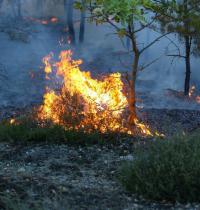
Cities and tourist areas such as Catalonia, Madrid, and Valencia are among those most at risk of catastrophic damage from wildfires in Europe, according to research. An international research team has put together a map using satellite data that details the countries in Europe with the highest likelihood of experiencing wildfire damage — with large fires occurring more frequently near “Wildland-Urban Interface” WUI areas in the countries of Albania, Bulgaria, Cyprus, France, Italy, and Spain.
-
-
Water problems in Asia’s future?
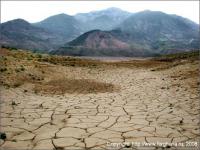
Economic and population growth on top of climate change could lead to serious water shortages across a broad swath of Asia by the year 2050. Having run a large number of simulations of future scenarios, the researchers find that the median amounts of projected growth and climate change in the next thirty-five years in Asia would lead to about one billion more people becoming “water-stressed” compared to today.
-
-
Fracking linked to most induced earthquakes in western Canada
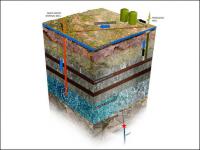
A survey of a major oil and natural gas-producing region in Western Canada suggests a link between hydraulic fracturing or “fracking” and induced earthquakes in the region. The study’s findings differ from those reported from oil and gas fields in the central United States, where fracking is not considered to be the main cause of a sharp rise in induced seismicity in the region. Instead, the proliferation of hundreds of small earthquakes in that part of the United States is thought to be caused primarily by massive amounts of wastewater injected back into the ground after oil and gas recovery.
-
-
Fracking-related quakes make central U.S. as vulnerable as California to tremor damage
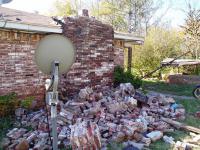
For the first time, new USGS maps identify potential ground-shaking hazards from both human-induced and natural earthquakes. The new report shows that approximately seven million people live and work in areas of the central and eastern United States (CEUS) with potential for damaging shaking from induced seismicity. Within a few portions of the CEUS, the chance of damage from all types of earthquakes is similar to that of natural earthquakes in high-hazard areas of California.
-
-
1.4 billion people face severe natural disaster risks in South Asia
New data has revealed that 1.4 billion people in South Asia, or 81 percent of the region’s population, are acutely exposed to at least one type of natural hazard and live in areas considered to have insufficient resources to cope with and rebound from an extreme event. Poor governance, weak infrastructure, and high levels of poverty and corruption amplify the economic and humanitarian losses associated with significant natural hazards events – and these factors will exacerbate the consequences of natural disasters especially in Africa, a continent which hosts eight out of the nine countries most vulnerable to natural hazards.
-
-
Understanding where tremblors are more likely to occur, helping communities prepare
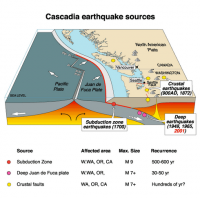
Some of the world’s largest earthquakes occur on subduction zones, where a cold dense oceanic plate moves under a warmer continental plate. This was the case for the massive Tohoku earthquake in Japan in 2011, which was followed by a tsunami with waves up to thirty-three feet that left thousands dead and inflicted extensive damage to buildings and infrastructure, including four major nuclear power stations.
-
-
Making sure insurance for an uncertain climate is effective
In December, negotiators at the Paris climate meeting adopted insurance as an instrument to aid climate adaptation. Earlier in the year, the leaders of the G7 pledged to bring climate insurance to 400 million uninsured individuals in poor countries by 2020. Experts welcome these developments, but also highlight the difficulties that policymakers will face in turning the ideas into action. They warn that ill-designed and poorly implemented insurance instruments could fail to reach the goals of negotiators, or worse, prove detrimental to the very people they are intended to protect.
-
-
To avoid multiple climate tipping points, CO2 emissions should be stopped by 2050: Study
To avoid multiple climate tipping points, policy makers need to act now to stop global CO2 emissions by 2050 and meet the Paris Agreement’s goal of limiting global warming to 1.5 °C above pre-industrial levels, a new study has said. The new research shows that existing studies have massively under-valued the risk that ongoing carbon dioxide emissions pose of triggering damaging tipping points.
-
-
2015 made history with record heat, weather extremes: WMO
The year 2015 made history, with shattered temperature records, intense heatwaves, exceptional rainfall, devastating drought, and unusual tropical cyclone activity, according to the World Meteorological Organization. That record-breaking trend has continued in 2016. The global average surface temperature in 2015 broke all previous records by a wide margin, at about 0.76° Celsius above the 1961-1990 average because of a powerful El Niño and human-caused global warming. With 93 percent of excess heat stored in the oceans, ocean heat content down to 2,000 meters also hit a new record.
-
-
Increasing speed, accuracy of flood risk assessment
New research hopes to provide advances in the planning for flood risk, thanks to a new, faster method of assessing the highly complex factors that cause floods in a specific location. The results of the study have shown it is possible to increase the speed of a highly accurate flood risk prediction by between 100-1,000 times compared with techniques currently used by researchers to estimate flood risk under climate change.
-
-
February global temperature sets new record for the globe
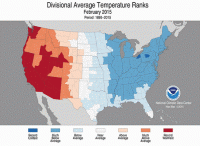
The average temperature for the globe during December-February was 2.03°F above the twentieth century average. This was the highest temperature for December-February in the 1880-2016 record. February 2016 also marks the tenth consecutive month in which a monthly global temperature record has been broken. Record warmth across the globe was aided by a strong El Niño which peaked during the winter.
-
-
Wetland restoration in Midwest would help reduce catastrophic floods
Restoration of wetlands in the Midwest has the potential significantly to reduce peak river flows during floods — not only now, but also in the future if heavy rains continue to increase in intensity. Wetland restoration could also provide a small step toward a hydrologic regime in this region that more closely resembles its historic nature, before roads and cities were constructed, forests were lost, and millions of acres tile-drained to increase agricultural production.
-
-
Up to 70 percent of Northeast U.S. coast likely to adapt to rising seas
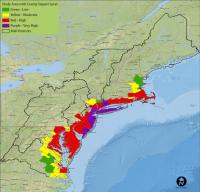
Much of the coast from Maine to Virginia is more likely to change than to simply drown in response to rising seas during the next seventy years or so, according to a new study led by the U.S. Geological Survey. The study is based on a new computer model that captures the potential of the Northeast coast to change, driven by geological and biological forces, in ways that will reshape coastal landscapes.
-
-
Helping policymakers plan for sea level rise
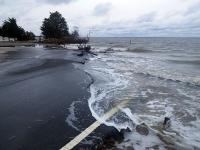
A new study could help protect more than thirteen million American homes that will be threatened by rising sea levels by the end of the century. It is the first major study to assess the risk from rising seas using year 2100 population forecasts for all 319 coastal counties in the continental U.S. Previous impact assessments use current population figures to assess long-term effects of coastal flooding. The data can help policymakers develop practical adaptation strategies for protecting land threatened by frequent and repeated inundation.
-
-
Social media used to assess damage caused by natural disasters
A new study concludes that it is possible to determine the damage caused by a natural disaster in just a few hours by using data from social networks. “Twitter, the social network which we have analyzed, is useful for the management, real-time monitoring and even prediction of the economic impact that disasters like Hurricane Sandy can have,” says one of the researchers.
-
More headlines
The long view
The Surprising Reasons Floods and Other Disasters Are Deadlier at Night
It’s not just that it’s dark and people are asleep. Urban sprawl, confirmation bias, and other factors can play a role.
Why Flash Flood Warnings Will Continue to Go Unheeded
Experts say local education and community support are key to conveying risk.
